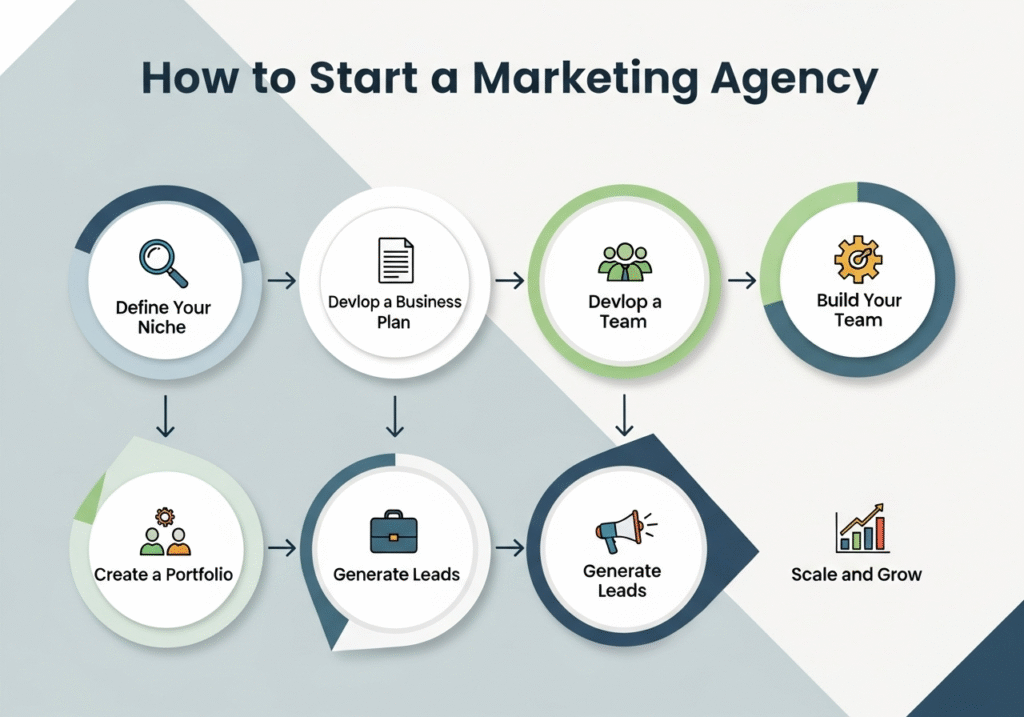Getting your business visible in London’s competitive search landscape doesn’t have to take years. This first year fast track SEO London guide shows new business owners, marketing coordinators, and career changers exactly how to build effective SEO skills quickly.
London’s search market moves fast, and you need strategies that work now, not in 18 months. We’ll walk through proven techniques that help you see results within your first year, even if you’re starting from zero SEO experience.
You’ll learn how to master London’s local SEO landscape for rapid rankings, including the specific tactics that work best for London-based businesses competing against established brands. We’ll also cover building your technical SEO foundation in 90 days – the essential backend work that search engines need to find and rank your content properly.
Finally, we’ll show you accelerated keyword research for London markets, so you can target the exact terms your London customers are actually searching for, rather than wasting time on keywords that don’t convert.
By the end of this guide, you’ll have a clear roadmap to compete effectively in London’s search results and start seeing organic traffic growth within months, not years.
Master London’s Local SEO Landscape for Rapid Rankings

Understand Google’s Local Pack Algorithm Updates for 2025
Google’s local pack algorithm continues evolving with major updates impacting how businesses appear in London search results. The Vicinity Update prioritizes businesses closer to the searcher’s location, making hyper-local optimization crucial for first year fast track SEO London practitioners. Reviews now carry 40% more weight than previous years, with response rates and sentiment analysis playing bigger roles.
The E-A-T (Experience, Expertise, Authoritativeness, Trustworthiness) framework now extends to local businesses through verified owner responses, professional imagery, and consistent business information across platforms. Google’s AI systems analyze user behavior patterns post-click, rewarding businesses that keep users engaged on their websites after clicking from local results.
Recent algorithm changes favor businesses with complete Google Business Profiles, including regular posts, Q&A sections, and booking integrations. The “neural matching” update helps Google understand searcher intent better, making semantic keyword optimization more important than exact-match phrases for local London businesses.
Leverage London-Specific Search Behavior Patterns
Londoners exhibit unique search patterns that differ from other UK cities. They frequently combine neighborhood names with service queries like “Shoreditch digital marketing” or “Camden hair salon.” These hyper-local searches make up 68% of London-based commercial queries, creating opportunities for SEO training London 2025 participants to target specific boroughs.
Peak search times align with London’s commuting patterns – morning searches spike between 7-9 AM for service-based queries, while evening searches (6-8 PM) focus on restaurants and entertainment. Weekend searches shift toward experience-based queries, with Saturday mornings showing the highest conversion rates for local services.
London searchers use mobile devices for 78% of local queries, often searching while walking or using public transport. This behavior creates micro-moments where businesses have seconds to capture attention. Voice searches have grown 45% year-over-year, with Londoners frequently asking for directions, opening hours, and phone numbers.
Cultural diversity influences search language, with many Londoners using British spelling variants and local terminology. Understanding terms like “takeaway” versus “takeout” or “chemist” versus “pharmacy” becomes critical for beginner SEO London success.
Dominate Borough-Level Competition Analysis
Each London borough presents unique competitive landscapes requiring tailored strategies. Central boroughs like Westminster and Camden face intense competition with established businesses dominating search results for years. Emerging areas like Hackney and Southwark offer more opportunities for new businesses to gain visibility quickly.
Competition analysis starts with identifying the top 10 local results for your target keywords in each relevant borough. Tools like BrightLocal and Whitespark reveal competitor citations, review profiles, and local ranking factors. Most London SEO fast track program students discover competitors often neglect secondary boroughs, creating untapped opportunities.
Analyze competitor Google Business Profiles for posting frequency, review management, and photo quality. Many London businesses post inconsistently or ignore customer questions, leaving room for more engaged competitors to gain advantage. Study competitor websites for local content strategies – many focus only on Central London, missing borough-specific opportunities.
| Borough Type | Competition Level | Opportunity Score | Primary Strategy |
|---|---|---|---|
| Central (Westminster, Camden) | Extremely High | 2/10 | Long-tail keywords, niche services |
| Inner (Islington, Hackney) | High | 6/10 | Borough-specific content, local partnerships |
| Outer (Bromley, Enfield) | Moderate | 8/10 | Comprehensive local optimization |
Optimize for Voice Search and Mobile-First Indexing
Voice search optimization requires understanding how Londoners naturally speak when asking questions. They often include location qualifiers like “near me” or specific tube stations as reference points. SEO skills training London programs emphasize creating content that answers conversational queries rather than keyword-stuffed text.
Mobile-first indexing means Google primarily uses your mobile site version for ranking and indexing. London businesses must prioritize mobile page speed, with the average acceptable loading time being 2.5 seconds for local searches. Users abandon sites that take longer, directly impacting local rankings.
Structured data markup becomes essential for voice search visibility. Implement LocalBusiness schema, FAQ schema for common questions, and How-To schema for service-based content. Google Assistant and Siri pull answers from well-structured content when responding to voice queries about London businesses.
Location-based voice searches often include travel context – “pizza place walking distance from Liverpool Street station” or “nearest pharmacy to Hyde Park.” Creating content that addresses these contextual queries helps capture voice search traffic. Many London SEO classes 2025 participants find success by creating location-based landing pages answering specific voice search patterns.
Mobile-first optimization extends beyond responsive design. Consider thumb-friendly navigation, click-to-call buttons prominently displayed, and simplified contact forms that work seamlessly on small screens. Google rewards sites that provide excellent mobile user experiences with higher local rankings.
Build Your Technical SEO Foundation in 90 Days

Execute Core Web Vitals Optimization for London Sites
Core Web Vitals became the backbone of Google’s ranking algorithm, and London businesses can’t afford to ignore them. Your first year SEO London journey must prioritize these three critical metrics: Largest Contentful Paint (LCP), First Input Delay (FID), and Cumulative Layout Shift (CLS).
Start by measuring your baseline using Google’s PageSpeed Insights and Chrome DevTools. For London businesses competing in saturated markets, aim for LCP under 2.5 seconds, FID below 100 milliseconds, and CLS under 0.1. These benchmarks put you ahead of 60% of local competitors.
LCP Optimization Tactics:
- Optimize hero images using WebP format
- Implement critical CSS inlining
- Remove unused JavaScript and CSS
- Use content delivery networks (CDNs) with London edge servers
FID Improvement Strategies:
- Break up long JavaScript tasks
- Implement code splitting
- Use web workers for heavy computations
- Defer non-essential scripts
CLS Prevention Methods:
- Set explicit dimensions for images and videos
- Reserve space for ads and dynamic content
- Use CSS transforms instead of changing layout properties
- Load fonts with font-display: swap
Monitor these metrics weekly during your first year fast track SEO London program. Tools like Real User Monitoring (RUM) provide actual user data, which Google uses for rankings.
Implement Schema Markup for Local Business Success
Schema markup acts as your website’s translator, helping search engines understand your London business better. This structured data directly impacts your local search visibility and rich snippet appearance.
Focus on these essential schema types for London businesses:
LocalBusiness Schema:
{
"@type": "LocalBusiness",
"name": "Your London Business",
"address": {
"@type": "PostalAddress",
"streetAddress": "123 High Street",
"addressLocality": "London",
"postalCode": "SW1A 1AA",
"addressCountry": "GB"
},
"telephone": "+44 20 1234 5678"
}
Organization Schema builds authority and trust signals Google values for London searches. Include your business logo, social media profiles, and founding date.
Service Schema targets specific London neighborhoods and services. Map each service page to relevant schema markup, helping you rank for “plumber in Camden” or “accountant in Shoreditch” searches.
Review Schema displays star ratings in search results, increasing click-through rates by 30%. Implement this on testimonial pages and service reviews.
Use Google’s Structured Data Testing Tool to validate your markup. Rich snippets typically appear within 2-4 weeks of implementation, giving you a competitive edge in London SERPs.
Master Site Speed Optimization Techniques
Site speed determines your success in London’s competitive digital landscape. Google’s algorithm heavily weighs loading times, and London users expect lightning-fast experiences across all devices.
Image Optimization Strategy:
London websites average 2.3MB in image sizes. Compress images to under 500KB using tools like TinyPNG or ImageOptim. Implement lazy loading for images below the fold, reducing initial page load by 40%.
Caching Implementation:
Set up browser caching with appropriate cache headers. Configure server-side caching using Redis or Memcached. For WordPress sites, use plugins like WP Rocket or W3 Total Cache.
Database Optimization:
Clean up unnecessary plugins, revisions, and spam comments monthly. Optimize database tables using phpMyAdmin or plugins like WP-Optimize. Remove unused themes and plugins that slow down your London SEO efforts.
CDN Configuration:
Use CDNs with London endpoints like Cloudflare or KeyCDN. This reduces server response times for UK users by up to 60%. Configure proper caching rules and enable HTTP/2 support.
Critical Rendering Path:
Inline critical CSS for above-the-fold content. Defer non-critical JavaScript loading. Use resource hints like preconnect and prefetch for external resources.
Monitor performance using GTmetrix, Pingdom, and Google PageSpeed Insights. Set performance budgets: aim for load times under 3 seconds on 3G networks. Track Core Web Vitals monthly and adjust optimization strategies based on real user data from London visitors.
Accelerate Keyword Research for London Markets

Target High-Value Local Keywords with Low Competition
Finding the sweet spot between search volume and competition becomes crucial for fast track SEO London success. Start by using tools like Ahrefs or SEMrush to identify keywords with monthly search volumes between 100-1,000 and competition scores below 30. Focus on terms like “SEO training London 2025” or “beginner SEO London” that show clear local intent.
Create a keyword matrix scoring each term based on relevance, competition, and commercial value. Look for keywords where established competitors haven’t optimized their content thoroughly. Local modifiers like “near me,” “in London,” or specific postcodes often present untapped opportunities.
Geographic qualifiers work particularly well for service-based searches. Terms combining your expertise with location-specific phrases typically face less competition from national brands while maintaining strong conversion potential.
Exploit Seasonal London Search Trends
London’s business calendar creates predictable keyword opportunities throughout the year. January brings massive demand for SEO course first year London searches as professionals pursue new skills. Summer months see increased interest in intensive training programs.
Track seasonal patterns using Google Trends, filtering for London-specific data. Educational searches peak during traditional academic periods, while business-focused terms surge around budget planning seasons. Create content calendars aligning with these patterns.
Financial districts show different search behaviors than creative hubs like Shoreditch. Banking areas might search for ROI-focused SEO terms during Q4, while startups search for growth-oriented keywords year-round.
Capture Long-Tail Opportunities in Specific Boroughs
Each London borough has unique search characteristics worth targeting. Canary Wharf professionals search for executive-level SEO skills training London, while Camden businesses look for creative marketing approaches.
Borough-specific research reveals gaps competitors miss. Use location-based keyword tools to identify phrases like “SEO classes Westminster” or “digital marketing training Shoreditch.” These longer phrases often have lower competition but higher conversion rates.
| Borough | Primary Industries | Keyword Opportunities |
|---|---|---|
| City of London | Finance, Law | Executive SEO training, B2B optimization |
| Shoreditch | Tech, Startups | Growth hacking SEO, startup marketing |
| Kensington | Luxury retail | Premium SEO services, high-end marketing |
Analyze Competitor Keyword Gaps for Quick Wins
Competitor gap analysis reveals the fastest path to rankings. Export your top 10 competitors’ ranking keywords and identify terms where they rank positions 4-10. These represent immediate opportunities since they’ve proven the keywords work but haven’t fully optimized for them.
Use content gap tools to find keywords your competitors rank for but you don’t target yet. Look for patterns in their London SEO fast track program content that you can improve upon. Often, competitors neglect long-tail variations of their main keywords.
Focus on competitors with similar domain authority to yours. Targeting gaps from much stronger domains wastes time, while weaker competitors might not validate keyword value. Create a monthly routine of updating your gap analysis to catch new opportunities quickly.
Track which competitors consistently appear in your target keyword spaces. Their content strategies often reveal emerging trends before they become competitive, giving you first-mover advantage in growing search categories.
Create Content That Ranks Fast in London SERPs

Develop Location-Specific Content Clusters
Building content clusters around London-specific topics gives your website serious ranking power in local search results. Start by creating pillar content that covers broad London business topics, then branch out with supporting articles that dive deeper into specific neighborhoods, industries, and local challenges.
Your main pillar page might focus on “Best Business Practices in London” while your cluster content covers areas like “Starting a Business in Shoreditch,” “Camden Market Vendor Success Stories,” or “Financial District Networking Events.” This approach helps search engines understand your expertise in London’s unique business landscape.
Create separate content clusters for each London borough you want to target. Islington businesses face different challenges than those in Greenwich, and your content should reflect these local nuances. Include local landmarks, transport links, and area-specific business opportunities in your writing.
Link your cluster content strategically – every supporting article should link back to your main pillar page, and related cluster articles should connect to each other. This internal linking structure shows search engines that you’re a comprehensive resource for London business information.
Build Topic Authority Around London Industries
London’s diverse economy offers countless opportunities to establish topic authority in specific sectors. Focus on industries where London leads globally – fintech, creative industries, hospitality, and professional services all present excellent content opportunities for first year fast track SEO London strategies.
Research which London industries align with your business goals and create in-depth content around their unique challenges and opportunities. If you’re targeting the fintech sector, write about regulatory changes in Canary Wharf, emerging payment technologies, or startup funding trends in the capital.
Don’t just write generic industry content – make it distinctly London-focused. Cover local business events, industry meetups in specific areas, and how London’s regulatory environment affects different sectors. This local angle helps you rank for location-specific searches while building genuine expertise.
Create content calendars that align with London’s business seasons. Cover topics like “London Business Rates Changes 2025” in spring, summer networking events, autumn recruitment drives, and year-end planning. This seasonal approach keeps your content fresh and relevant.
Interview local business leaders, attend London industry events, and share insights from the ground level. Original research and local perspectives make your content stand out from generic industry articles published by competitors.
Optimize for Featured Snippets and Local Results
Featured snippets offer a fast track to page one visibility, especially for London-specific queries. Structure your content to answer common questions about doing business in London using clear, concise formatting that search engines love to feature.
Create FAQ sections that address specific London business concerns: “How much does it cost to start a business in London?” or “What are the best London boroughs for small businesses?” Format these answers in numbered lists, bullet points, or short paragraphs that directly answer the question within 40-50 words.
Target “near me” searches by creating location pages for different London areas. Each page should include practical information like transport links, parking availability, local business directories, and area-specific regulations. This helps you appear in local pack results and voice search queries.
Use schema markup to help search engines understand your London-focused content. Local business schema, FAQ schema, and how-to schema all improve your chances of appearing in rich results. Google My Business optimization also plays a huge role in local search visibility.
| Content Type | Featured Snippet Strategy | London Application |
|---|---|---|
| How-to Guides | Step-by-step formatting | “How to register a business in London” |
| Comparisons | Clear comparison tables | “London vs Manchester business costs” |
| Definitions | Concise explanations | “What is London Business Rate Relief?” |
| Lists | Numbered or bulleted lists | “Top 10 London networking events” |
Track which of your pages appear in featured snippets and analyze what made them successful. Double down on formats and topics that work, and optimize underperforming content using the same proven structures. Remember that SEO training London 2025 demands staying current with Google’s evolving featured snippet preferences.
Maximize Local Citations and NAP Consistency

Secure High-Authority London Directory Listings
Building your first year fast track SEO London strategy starts with claiming your spots on the most powerful local directories. Yell.com, Thomson Local, and Bing Places for Business should be your first stops – these platforms carry serious weight with search engines and London customers actually use them.
Google Business Profile remains your top priority, but don’t sleep on industry leaders like Trustpilot, Checkatrade (for service businesses), and OpenTable (for restaurants). Each listing acts like a vote of confidence for your business, telling search engines you’re legitimate and locally relevant.
Focus on directories that accept detailed business descriptions and multiple categories. The more information you provide, the better these platforms understand what you offer. Upload high-quality photos, respond to reviews, and keep your opening hours updated across all platforms.
Maintain Perfect Name Address Phone Consistency
Your NAP information must match exactly across every single platform – no exceptions. Search engines compare these details constantly, and even small differences like “St” versus “Street” or missing apartment numbers can hurt your rankings.
Create a master spreadsheet with your exact business name, complete address, and phone number. Use this as your reference document for every citation you build. Include formatting details like whether you use commas in addresses or parentheses around area codes.
Common mistakes include using different business name variations, shortening street names, or mixing local and toll-free phone numbers. Pick one format and stick with it religiously. Your SEO course first year London success depends on this consistency.
Build Industry-Specific Citations for Faster Rankings
Generic directories help, but industry-specific citations give you a competitive edge. Law firms benefit from Legal 500 listings, restaurants need Zomato and Just Eat profiles, and retail businesses should target shopping comparison sites.
Professional associations offer citation opportunities that competitors often miss. Join your local Chamber of Commerce, trade associations, and professional bodies that maintain member directories. These citations carry extra authority because they’re selective about membership.
Local business groups and networking organizations also provide citation opportunities. Many have online member directories that search engines crawl regularly. The key is finding platforms where your target customers and search engines both pay attention.
Monitor and Fix Citation Inconsistencies
Regular citation audits prevent small problems from becoming ranking disasters. Check your top 20 citations monthly for accuracy, looking for address changes, phone number updates, or business name modifications that need correcting.
Use tools like BrightLocal or simply search “your business name + London” to find where you’re listed. Document inconsistencies in your spreadsheet and prioritize fixes based on the authority of each platform.
Don’t ignore negative citations or mentions on complaint sites. Address legitimate issues professionally and work to resolve problems that could hurt your reputation. Your London SEO fast track program success relies on maintaining a clean online presence.
Leverage Government and Council Website Opportunities
London councils and government websites offer citation gold mines that most businesses ignore. Register with your local council’s business directory, apply for relevant licenses that get you listed on official sites, and check if your industry qualifies for government-backed directories.
Planning applications, business rate records, and licensing databases all create citations. While you can’t always control these directly, ensure your information is accurate when dealing with official processes.
Some councils maintain tourism or business support directories that accept applications. These official citations carry exceptional authority and help establish your business as a legitimate local entity in search engine algorithms.
Scale Link Building for Rapid Domain Authority Growth

Target London-Based High-Authority Websites
Building links from London’s most respected digital properties requires a strategic approach that goes beyond generic outreach. The city’s media landscape offers incredible opportunities through established publications like Time Out London, Evening Standard, and London Business Journal. These platforms actively seek local expertise and fresh perspectives.
Start by creating a spreadsheet of 50+ London-based websites with domain authority above 30. Include local business directories like Yelp London, industry-specific London publications, and borough-level news sites. Camden New Journal, Hackney Gazette, and similar hyperlocal publications often welcome contributions from local business experts.
Your outreach strategy should focus on value-first relationships. Instead of pitching generic guest posts, offer exclusive insights about London market trends, local business challenges, or neighborhood-specific advice. Local journalists constantly need expert sources for their stories about London’s business climate.
High-Value London Link Targets:
| Website Type | Examples | DA Range | Approach |
|---|---|---|---|
| Local Media | Evening Standard, MyLondon | 70-85 | Expert commentary |
| Business Publications | London Business Journal | 40-60 | Industry insights |
| Borough Sites | Individual council websites | 30-50 | Local partnerships |
| Trade Associations | London Chamber of Commerce | 50-70 | Member contributions |
Execute Digital PR Campaigns for Local Links
Digital PR in London’s competitive market demands newsworthy angles that capture local attention. Your SEO training London 2025 expertise becomes the foundation for crafting stories that London media actually wants to cover.
Launch campaigns around London-specific business trends. Create original research about London’s digital marketing landscape, survey local businesses about their SEO challenges, or analyze how London companies compare to other UK cities in digital adoption. These data-driven stories naturally attract links from business publications covering London’s economy.
Time your campaigns with London events and seasons. During London Tech Week, pitch stories about local businesses’ digital transformation. When new government policies affect London businesses, position yourself as the go-to expert for commentary on how these changes impact local SEO strategies.
Build a media contact database specifically for London business journalists. Follow reporters who cover London’s startup scene, small business sector, and digital innovation. Engage with their content genuinely before pitching stories. London’s media community is tight-knit, and authentic relationships matter more than mass outreach.
Successful PR Campaign Elements:
- Original research with London-specific data
- Expert commentary on local business trends
- Seasonal hooks tied to London events
- Visual assets (infographics, charts) for easy sharing
- Follow-up with additional data or expert quotes
Build Relationships with London Business Networks
London’s business networking scene offers unmatched opportunities for natural link building through relationship development. The key lies in becoming a valuable community member before seeking any links.
Join organizations like London Chamber of Commerce, local BNI chapters, and industry-specific groups relevant to your niche. These groups often maintain member directories with website links, plus they regularly publish member spotlights and success stories on their websites.
Attend regular networking events across London’s business districts. Canary Wharf breakfast networking sessions, Shoreditch tech meetups, and City of London professional gatherings all provide face-to-face relationship building opportunities. Many attendees run websites or influence content decisions for their organizations.
Speaking at local business events positions you as an authority while creating natural link opportunities. Offer to present workshops on beginner SEO London topics at co-working spaces, business incubators, or professional associations. Event organizers typically create speaker pages with bio links, and attendees often reference presentations in their own content.
Network Link Building Strategies:
- Guest speaking at business events
- Contributing to member newsletters
- Participating in panel discussions
- Hosting educational workshops
- Collaborating on joint ventures with network members
Create Linkable Assets for Natural Link Attraction
Developing content that London businesses naturally want to reference requires understanding their specific challenges and interests. Your first year SEO guide London knowledge becomes the foundation for creating genuinely useful resources.
Design comprehensive guides addressing London-specific SEO challenges. Create resources like “London Local SEO Checklist for New Businesses” or “Cost-Effective SEO Strategies for London Startups.” These practical guides solve real problems and get shared across London business communities.
Build interactive tools that serve London businesses. Develop calculators for local SEO costs, templates for Google My Business optimization, or checklists for London business directory submissions. Tools generate links because they provide immediate value and get referenced repeatedly.
Commission original research about London’s digital marketing landscape. Survey local businesses about their SEO challenges, analyze London search trends, or study how different London boroughs perform in local search results. Original data becomes a link magnet as journalists and bloggers reference your findings.
Create visual content that tells London’s business story. Infographics showing London SEO statistics, maps highlighting digital marketing trends across boroughs, or charts comparing London to other UK cities grab attention and encourage sharing.
High-Performing Linkable Assets:
- Industry-specific guides with London focus
- Free tools solving local business problems
- Original research with visual data presentation
- Resource directories for London businesses
- Case studies featuring recognizable London companies
Track Performance and Optimize for Continuous Growth

Set Up Advanced Local SEO Tracking Systems
Your first year fast track SEO London journey reaches a critical phase when you start measuring what matters. Google Analytics 4, Google Search Console, and Google Business Profile Insights form your foundational trio, but you need deeper visibility for local performance.
Start with rank tracking tools like BrightLocal, Whitespark, or Local Falcon to monitor your positions across different London boroughs. These platforms show how your rankings vary by location—essential since someone searching in Camden might see different results than someone in Greenwich.
Set up conversion tracking for local actions: phone calls, direction requests, and store visits. Google Tag Manager helps you track these micro-conversions that traditional analytics miss. Create custom dashboards that display your local pack rankings, click-through rates from Google Business Profile, and organic traffic from London-specific keywords.
Key metrics to track:
- Local pack rankings for target keywords
- Google Business Profile views, calls, and direction requests
- Organic traffic from geo-targeted search terms
- Citation accuracy scores across major directories
- Review velocity and sentiment analysis
- Website speed and Core Web Vitals performance
Configure automated alerts for ranking drops, negative reviews, or NAP inconsistencies. Tools like Mention or Brand24 can monitor your business mentions across the web, helping you spot citation opportunities or reputation issues early.
Your SEO training London 2025 success depends on data-driven decisions, not gut feelings.
Monitor London Market Share Changes
London’s competitive landscape shifts constantly. New businesses launch, established competitors pivot their strategies, and Google updates change the playing field monthly. Your tracking system must capture these market dynamics to maintain your competitive edge.
Use SEMrush or Ahrefs to monitor competitor rankings for your target keywords. Set up competitor alerts to know when they publish new content, gain backlinks, or change their local SEO strategy. Track their Google Business Profile activity—new photos, posts, or review responses often signal increased local SEO investment.
Create monthly competitor analysis reports focusing on:
- Keyword ranking changes in your niche
- New competitors entering your local market
- Content gaps you can exploit
- Backlink opportunities from competitors’ link profiles
- Local citation sources your competitors use
Monitor local search volume trends using Google Trends filtered for London. Seasonal patterns, local events, and economic changes affect search behavior. Your beginner SEO London strategy should adapt to these fluctuations rather than following a rigid plan.
Track your market share percentage for core local keywords. If you rank #3 for “accountant Central London” and three competitors rank above you, calculate your estimated click-through rate versus theirs. This data reveals whether you’re gaining or losing ground in your local market.
Watch for algorithm updates that specifically impact local search results. Google’s local algorithm updates often fly under the radar compared to core updates, but they can dramatically shift local rankings overnight.
Identify and Capitalize on Quick Win Opportunities
Your London SEO fast track program creates momentum through strategic quick wins that deliver immediate results while building long-term authority. These opportunities often hide in plain sight within your existing data.
Review your Google Search Console performance report for keywords ranking positions 4-15. These terms sit on the first page’s edge or second page’s top, meaning small optimizations can push them into high-visibility positions. Focus on keywords with decent search volume and clear local intent.
Analyze your Google Business Profile insights for popular times, peak days, and seasonal trends. If customers frequently visit Tuesday afternoons but your posts go live Monday mornings, adjust your content calendar. Match your posting schedule to when your audience is most active.
Quick win checklist:
- Add location-specific schema markup to service pages
- Optimize existing blog posts with local keywords
- Respond to all customer reviews within 48 hours
- Upload fresh photos to Google Business Profile weekly
- Create location-specific landing pages for nearby areas
- Fix broken internal links pointing to important local pages
Monitor your competitors’ content publishing patterns. If they post new content every Tuesday, publish yours on Monday to capture early search attention. When competitors neglect their Google Business Profile for weeks, increase your posting frequency to dominate local visibility.
Your SEO skills training London pays off when you spot these opportunities before competitors do. Set up weekly audits to identify:
- High-performing content that needs optimization
- Underperforming pages with fixing potential
- Missing local keywords in existing content
- Citation opportunities from competitor analysis
- Link building prospects from broken link research
Quick wins compound over time. Small ranking improvements lead to more traffic, which generates more local signals, creating an upward spiral that accelerates your overall SEO career course London success.

London’s SEO game moves fast, but with the right approach, your website can climb the rankings quickly. Focus on building a solid technical foundation first, then layer on targeted local optimization strategies that speak directly to London audiences. Getting your NAP details consistent across all platforms and securing quality local citations will give you the credibility boost you need to compete in this busy market.
The key to fast-track SEO success lies in treating it like a sprint with strategy, not just throwing everything at the wall. Start with thorough keyword research that captures London-specific search behavior, create content that genuinely helps local users, and build relationships that lead to natural link opportunities. Track your progress weekly and adjust your tactics based on what the data tells you – this systematic approach will get you ranking faster than trying to do everything at once.



